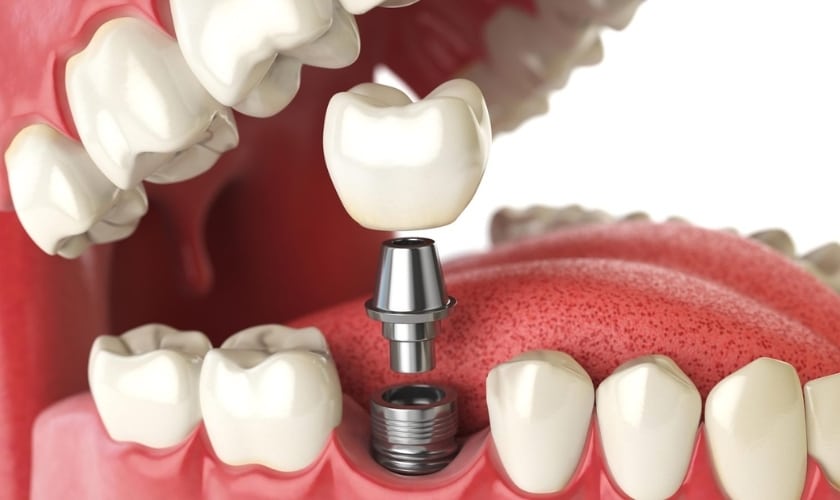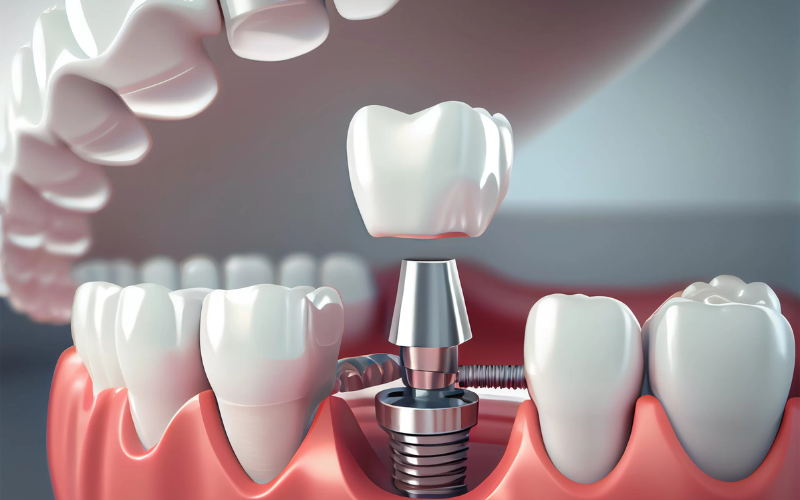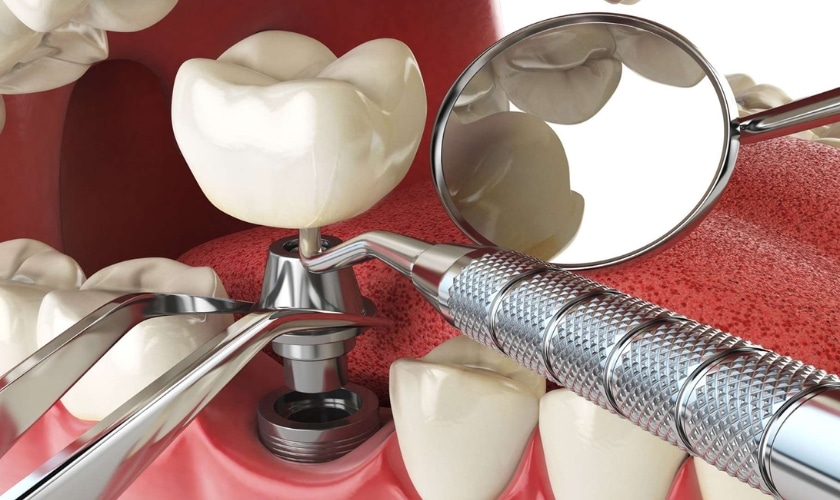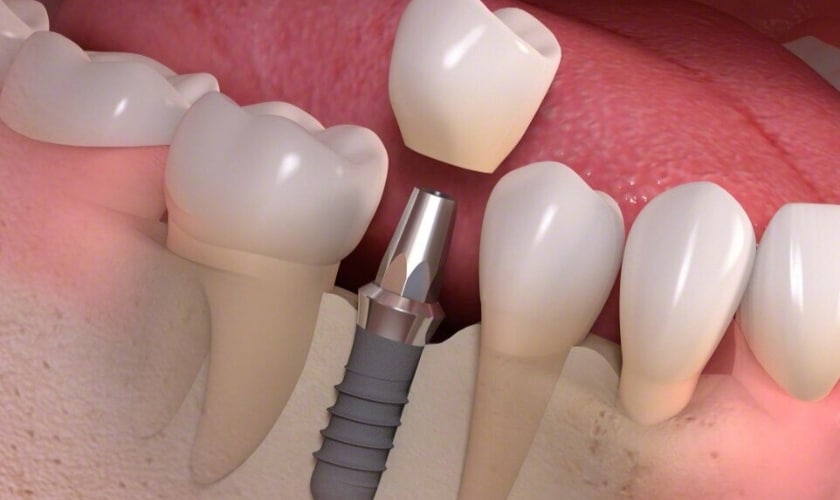
Dental implants have revolutionized the field of dentistry, offering a permanent solution to missing teeth that looks, feels, and functions like natural teeth. However, like any other dental restoration, their success and longevity depend significantly on how well they are cared for. This comprehensive guide provides essential tips for maintaining dental implants and ensuring they last for many years.
Understanding Dental Implants
Before delving into care tips, it's important to understand what dental implants are and how they work. A dental implant consists of three main components:
-
Implant Fixture: A titanium post surgically placed into the jawbone, acting as the root of the artificial tooth.
-
Abutment: A connector that holds the implant fixture and the crown together.
-
Crown: The visible part of the implant that resembles a natural tooth.
Dental implants integrate with the jawbone through a process called osseointegration, providing a stable foundation for the replacement teeth. Proper care is crucial to prevent complications such as infection, bone loss, or implant failure.
Immediate Post-Operative Care
The journey to maintaining healthy dental implants starts immediately after the surgical procedure. Here are some key steps to follow:
1. Follow Post-Surgery Instructions
Your dentist will provide specific instructions tailored to your case. These may include:
-
Taking prescribed medications, such as antibiotics and pain relievers.
-
Applying ice packs to reduce swelling.
-
Avoiding strenuous activities for a few days.
2. Maintain Oral Hygiene
Keeping your mouth clean after surgery is crucial to prevent infection. Follow these tips:
-
Rinse Gently: Use a saltwater solution (one teaspoon of salt in a glass of warm water) to rinse your mouth several times a day, especially after meals.
-
Brush Carefully: Avoid the surgical site while brushing your teeth to prevent irritation. Use a soft-bristled toothbrush and be gentle around the affected area.
3. Monitor Your Diet
Immediately after surgery, stick to a soft-food diet to avoid putting pressure on the implant site. Gradually reintroduce solid foods as you heal. Some suitable foods include:
-
Mashed potatoes
-
Yogurt
-
Smoothies
-
Scrambled eggs
4. Avoid Smoking and Alcohol
Smoking and alcohol can impede the healing process and increase the risk of complications. It's advisable to avoid these substances for at least a week post-surgery, although quitting smoking altogether will greatly benefit the longevity of your implants.
Long-Term Care for Dental Implants
Once your dental implants have healed, maintaining them becomes part of your daily routine. Here’s how to ensure they remain in excellent condition:
1. Practice Good Oral Hygiene
Excellent oral hygiene is paramount for the success of dental implants. Here’s a detailed guide to maintaining a clean and healthy mouth:
Daily Brushing and Flossing
-
Brush Twice Daily: Use a soft-bristled toothbrush or an electric toothbrush to clean your teeth at least twice a day. Pay special attention to the gum line and the area around the implant.
-
Floss Daily: Use dental floss or interdental brushes to clean between your teeth and around the implants. This helps remove plaque and food particles that a toothbrush might miss.
Use Implant-Safe Products
-
Non-Abrasive Toothpaste: Choose a non-abrasive toothpaste to avoid scratching the surface of the implants.
-
Antimicrobial Mouthwash: Rinse with an antimicrobial mouthwash to reduce bacteria and maintain oral health.
2. Regular Dental Check-Ups
Regular visits to your dentist are crucial for monitoring the health of your dental implants. During these visits, your dentist will:
-
Examine Your Implants: Check for any signs of implant complications, such as inflammation or bone loss.
-
Professional Cleaning: Perform a thorough cleaning to remove plaque and tartar buildup that regular brushing and flossing might miss.
-
X-Rays: Take periodic X-rays to assess the condition of the bone around the implants.
3. Healthy Lifestyle Choices
A healthy lifestyle significantly contributes to the longevity of dental implants. Consider the following tips:
Avoid Smoking
Smoking can impair healing and increase the risk of implant failure. If you smoke, consider quitting to improve the overall success rate of your dental implants.
Balanced Diet
Maintain a balanced diet rich in vitamins and minerals to support overall oral health. Foods high in calcium and vitamin D, such as dairy products, leafy greens, and fortified cereals, can help maintain healthy bones and gums.
4. Protect Your Implants
Take precautions to protect your dental implants from damage:
Wear a Night Guard
If you grind your teeth at night, ask your dentist about getting a custom-made night guard. Teeth grinding can put excessive pressure on the implants and cause damage.
Use a Mouth Guard During Sports
If you participate in contact sports, wear a mouth guard to protect your teeth and implants from trauma.
Recognizing and Addressing Problems Early
Despite best efforts, issues can still arise with dental implants. Early detection and intervention are key to resolving these problems. Be on the lookout for the following signs:
1. Persistent Pain or Discomfort
While some discomfort is normal after the procedure, persistent pain may indicate a problem. Consult your dentist if you experience ongoing pain around the implant site.
2. Swelling or Inflammation
Swelling or inflammation that does not subside could signal an infection. Seek professional advice if you notice these symptoms.
3. Mobility of the Implant
A successful implant should feel stable and secure. If you notice any mobility or loosening of the implant, contact your dentist immediately.
4. Gum Recession
Gum recession around the implant can expose the metal post and lead to further complications. Regular check-ups can help monitor and manage gum health.
Advanced Care Techniques
For those seeking advanced care techniques, there are additional measures to enhance the longevity of dental implants:
1. Water Flossers
Water flossers can be highly effective in cleaning around implants. They use a stream of water to remove plaque and debris from hard-to-reach areas, providing a thorough cleaning.
2. Oral Irrigators
Similar to water flossers, oral irrigators can help maintain the health of your gums and implants. They are particularly useful for people with limited dexterity who find traditional flossing challenging.
3. Probiotics
Probiotics can help maintain a healthy balance of bacteria in your mouth, potentially reducing the risk of infections. Incorporate probiotic-rich foods like yogurt and kefir into your diet, or consider taking a probiotic supplement after consulting with your dentist.
Psychological and Social Benefits of Well-Maintained Implants
Taking good care of your dental implants not only ensures their longevity but also contributes to your overall well-being. Here’s how:
Improved Self-Esteem
A healthy, beautiful smile can boost your self-confidence and positively impact your social interactions. Well-maintained dental implants help you feel more secure about your appearance.
Enhanced Oral Function
With dental implants, you can enjoy a varied diet without worrying about loose dentures or missing teeth. Proper care ensures that your implants function optimally, allowing you to eat, speak, and smile with confidence.
Better Overall Health
Good oral health is linked to overall health. By maintaining your dental implants, you reduce the risk of oral infections that can affect other parts of your body, contributing to better general health.
Dental implants are a significant investment in your oral health and overall quality of life. With proper care and maintenance, they can last for many years, providing you with a natural-looking and functional solution to missing teeth. By following the tips outlined in this guide, you can ensure the longevity of your dental implants and enjoy a healthy, confident smile for years to come.
Remember, your dentist is your best resource for advice and guidance on caring for your dental implants. Regular check-ups and professional cleanings, combined with diligent home care, will help keep your implants in top condition. Invest in your oral health today, and reap the benefits of a beautiful, lasting smile.




